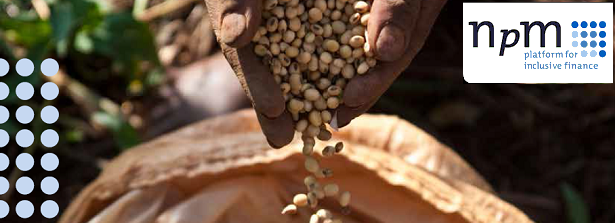Research: Financing of African smallholder farmers offers solutions for worldwide food security

The Dutch Platform for Inclusive Finance (NpM), AgriProFocus and the Food & Business Knowledge Platform (F&BKP) have investigated the bottlenecks that exist to finance smallholder farmers. The research provides insight into how food production systems work and how they can be strengthened with improved financial services. The research report, which was published on May 13, 2015, shows that linking financial institutions and producer organizations together offers new finance opportunities because risks are reduced.
‘It is known worldwide that the lack of access to financial services is an obstacle for farmers to produce food for the local market. The potential of smallholder farmers, especially in Africa, plays an important role in increasing local food security,’ says Josien Sluijs, director of NpM. Lilianne Ploumen, Minister for Foreign Trade and Development Cooperation, also states that financing is one of the bottlenecks in the food chain.
Collaboration and risk management
In the research, coordinated by ICCO Terrafina Microfinance, the success factors of 14 projects in four African countries – Ethiopia, Mali, Uganda and Rwanda – have been analyzed. In addition to specific financing mechanisms, the cooperation between financial institutions, producer organizations and investors has also been examined and specific risk mitigation strategies have been investigated. Traditionally, producer organizations (POs) were focused on supporting functions in the areas of farming and marketing. Their new role also includes being the bridge to financial institutions. The financiers have recently experienced there is less risk when farmers are organized, which means they are now more willing to grant financing.
Lisette van Benthum (AgriProFocus): ‘By analysing these projects, a wealth of interesting financial instruments have been compared and described. We have noticed that you do not only need financial products, but that it is also important to deal with the root causes of risk in agriculture, such as poor farming practices, non-access to inputs and the extremely weak negotiating position of individual smallholders.’
In the months of April and May, the extensive report was presented in the four countries during expert meetings with financial institutions, producer organizations, donors, the Dutch embassies and local central banks.
Conclusions and recommendations for better financing
NpM and AgriProFocus will present the conclusions and recommendations to policy makers in the Netherlands and in the countries where the study was carried out.
Two of these recommendations are:
- Financiers need to assume their new role and work on:
- Building up expertise to deal with risk management in agricultural finance;
- Developing tailor-made financial products for the specific crop and market concerned;
- Engaging in financing in various levels of the food chain (mix of microfinance, agricultural finance and SME finance);
- Playing a pro-active role in the development of farm finance programmes in collaboration with the various actors.
- Microfinance and Small and Medium-Sized Enterprise (SME) finance are linked.
Smallholder farmers need (micro) finance to purchase seeds and pesticides. These farmers also benefit from the fact that buyers of the produce can get loans to buy their products. Otherwise the farmers often experience severe delays in payment for their products. Additionally, larger working capital loans are needed, for example, in the processing industry.
The report has been realized in coordination with other stakeholders who are active in this field on an international level: Agriterra, the European Microfinance Platform (e-MFP), the Consultative Group to Assist the Poor (CGAP) and the Wageningen University and Research centre (Wageningen UR).






For anyone who will do agriculture in this era of climate change, irrigation is the in-thing now given the vagaries we experience from season to season. Irrigation can help farmers increase production in the dry season making them food secure and improving their incomes through selling their produce at an off season price. This however need to be given out in form of short term loans whereby a funding organization partners with the irrigation company, so that the farmers can acquire the irrigation systems, they be guided agronomy-wise on how to grow and manage these crops with the aim of recovery in the first season, at worst in the second season. When they pay off these irrigation systems they can continue to use them for over 5years. This is because most farmers are already doing agriculture with all agro inputs but lack scientific guidance on how to manage crops right to the expected yield and also lack money to pay for these drought resilience measures at once like irrigation systems. This model is already working with SACCOs and some financial institutions and money is really being recovered.
Smallholder farmers need micro finance and SACCOs to finance Irrigation infrastructure. This will benefit all the tripartite; the financier, the farmer and the irrigation equipment supplier.
———— http://www.siracoirrigation.com